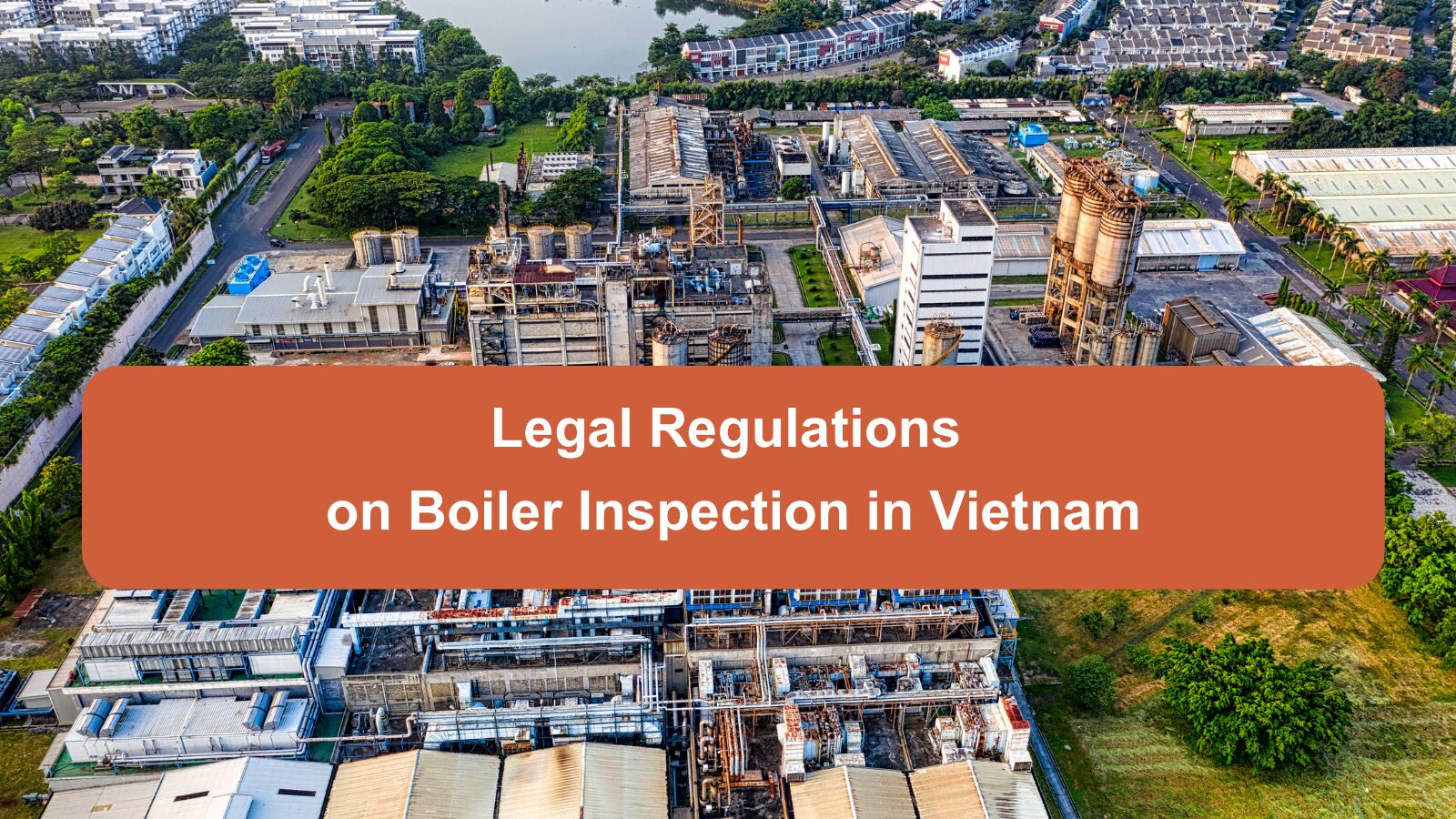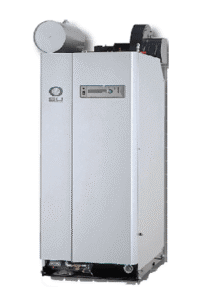1. Importance of Industrial Boiler Inspection
1.1. What is an Industrial Boiler?
An industrial boiler (also known as an industrial steam boiler) is a thermal device used to generate steam for production lines in various industries such as food and beverage, pharmaceuticals, chemicals, textiles, laundry, and hospitality.
An electric industrial boiler is a modern system that uses electricity instead of fuel combustion, helping save energy, reduce emissions, and allow easy automatic control.
1.2. Why is Boiler Inspection Mandatory?
Boilers operate under high pressure and temperature, posing risks such as explosions, burns, and damage to production lines. Therefore, the Vietnamese government mandates regular boiler inspections to ensure safety for operators and protect company assets.
2. Legal Regulations on Boiler Inspection in Vietnam
To ensure the proper, safe, and legal operation of industrial boilers and electric industrial boilers, businesses must understand the current legal framework issued by the government. These regulations apply not only to initial inspections but also to periodic checks, repairs, and operation of industrial thermal equipment.
The legal documents are based on scientific and practical foundations, focusing on the protection of workers, company property, and the production environment. Below is a summary of key Vietnamese laws and technical standards widely applied, along with specific requirements in sectors such as food, chemicals, and textiles.
2.1. General Legal Framework
Some notable legal documents include:
- Circular 36/2019/TT-BLĐTBXH: Lists equipment with strict safety requirements – including boilers.
- Circular 54/2016/TT-BLĐTBXH: Specifies the procedure for technical safety inspection of boilers and hot water generators.
- QCVN 01:2008/BLĐTBXH: National technical regulation on boiler safety.
- TCVN 7704:2007, TCVN 6413:1998: Vietnamese standards on the design, manufacture, and inspection of boilers.
2.2. Industry-Specific Regulations
Each industry may also have additional internal standards:
| Industry | Additional Regulations |
| Food & Beverage | HACCP and ISO 22000 standards require strict thermal equipment control |
| Pharmaceuticals | Compliance with GMP (Good Manufacturing Practice) standards |
| Textile | Compliance with ISO standards for environmental and occupational safety |
| Chemicals | Special requirements for fire and explosion safety, and environmental protection |
| Laundry & Hospitality | Inspection required to ensure safety for customers and operation staff |
3. Boiler Inspection Process: What Should Businesses Prepare?
To ensure smooth and compliant industrial boiler inspections without disrupting production, businesses must understand each step of the process. Proper preparation of documentation and technical readiness, along with coordination with inspection agencies, helps save time and ensures compliance with legal standards.
3.1. Standard Inspection Steps
The boiler inspection process in Vietnam is categorized into three main types, each with specific timing and objectives:
- Step 1: Initial Inspection: Applied to newly installed industrial boilers before official operation. This mandatory step ensures the equipment meets all technical and safety standards and matches design documentation.
- Step 2: Periodic Inspection: Conducted during operation to assess the boiler’s actual condition. The usual cycle is once every 2 years, but if the boiler is over 12 years old or operates under harsh conditions, the period may be shortened to once a year.
- Step 3: Extraordinary Inspection: Conducted after major technical changes such as relocation, replacement of key components, post-incident repair, or upon request from authorities.
3.2. Inspection Contents
A standard boiler inspection includes document verification and direct technical assessment of the equipment as follows:
- Technical Documentation Review: The company must prepare:
- Operation and maintenance logs
- Technical drawings and user manuals from the manufacturer
- Previous internal inspection reports (if any)
- External and Internal Equipment Inspection: Inspectors will visually check the physical condition of:
- Boiler body, insulation cover, steam and fire tubes
- Weld joints and pressure-bearing parts
- Valves, water supply and discharge lines, fuel supply lines (if applicable)
- Pressure Test: This step evaluates the boiler’s pressure resistance. The system is tested at a pressure higher than its rated operating pressure to check for tightness, strength, leaks, or deformation.
- Safety Device Inspection: Includes:
- Safety valve (automatic pressure relief)
- Pressure and temperature gauges
- Water level sensors
- Alarm and emergency shut-off systems (especially for electric industrial boilers)
For modern equipment such as electric industrial boilers, the control cabinet, sensors, and electrical systems must also be carefully inspected for insulation, anti-shock safety, and stable performance.
3.3. Documentation and Certification After Inspection
After completing the inspection, the authorized inspection unit will issue the following documents:
- Safety Inspection Label: Attached directly to the boiler body, indicating the inspection date, validity period, equipment number, and inspecting organization.
- Inspection Report: Records of evaluation results, measurement data, inspection images, and a pass/fail conclusion.
- Corrective Recommendations (if needed): In case the boiler fails, the inspection unit will provide repair instructions such as weld fixes, valve replacement, or pressure adjustments. Re-inspection is required before resuming operation.
4. Special Notes for Electric Industrial Boilers
4.1. Unique Features of Electric Industrial Boilers
Electric boilers do not emit exhaust gases, save installation space, and do not require a fuel storage area, making them ideal for industries such as food processing, pharmaceuticals, and high-end hospitality.
However, they require:
- A stable electrical system
- Proper grounding and shock protection
- Smart control and alarm systems
4.2. Is Inspection Required?
YES! Although they do not burn fuel, electric industrial boilers are still high-pressure thermal equipment and are therefore subject to mandatory inspection under Vietnamese law.
5. Consequences of Skipping Inspection & Enterprise Responsibilities
Failing to inspect industrial boilers or intentionally using unqualified ones is not only a legal violation but also poses severe financial, operational, and reputational risks. Particularly in sectors like food, pharmaceuticals, and chemicals where absolute safety is required, neglecting inspection can result in costly consequences for the business.
5.1. Administrative Penalties Under Vietnamese Law
According to Government Decree No. 12/2022/NĐ-CP, failure to conduct boiler inspections or using boilers with expired certificates will be strictly punished. Specific penalties include:
- VND 10–20 million: For failing to prepare or store inspection records as required.
- VND 30–50 million: For operating a boiler that has not undergone the initial inspection.
- VND 50–100 million: For using boilers with expired inspection certificates or continuing to use those deemed “non-compliant.”
In addition to financial penalties, businesses may be forced to suspend equipment operation or even halt production if the risk of unsafe operation is considered high.
5.2. Operational and Production Risks
Operating industrial or electric boilers without inspection exposes companies to numerous real-world risks:
- Production interruptions: Incidents such as boiler explosions, electrical fires, or safety valve failures can shut down entire production lines. In industries like food, beverage, or pharmaceuticals, such interruptions may result in tons of raw materials being wasted.
- Property and human losses: Even a small boiler explosion can cause wall collapse, glass breakage, machinery damage, and serious injuries to workers.
- Reputational damage: Business partners and clients demand transparency and high safety standards. An accident involving a non-compliant boiler can lead to contract loss and a damaged reputation within the supply chain — especially for export-oriented companies.
5.3. Criminal Liability for Serious Consequences
If a boiler-related incident causes severe consequences such as fatalities, major explosions, or property damage worth billions of VND, company executives may face:
- Criminal prosecution under the Penal Code for:
- Violating labor safety regulations (Article 295)
- Unintentional manslaughter (Article 128)
- Destruction of property (Article 178)
- A ban from holding management positions or working in industries requiring strict technical safety compliance.
This becomes even more serious if it is proven that the business knowingly operated a boiler that was uninspected or inspected improperly.
Therefore, boiler inspection — whether for industrial or electric boilers — is not merely an “administrative procedure” but a legal obligation and a vital part of risk management strategy, protecting the enterprise from unforeseen disasters.
6. Conclusion
Understanding and complying with legal requirements for industrial boiler inspection is essential for maintaining stable, safe, and lawful production operations. Particularly in highly regulated sectors such as food, chemicals, and pharmaceuticals, boilers must always operate accurately and undergo periodic inspections according to standards.
Contact Maruse Engineering for expert consultation on electric industrial boilers, optimal steam system solutions, and inspection or maintenance services following Japanese standards!


